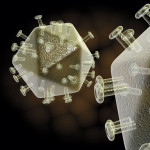For the first time, researchers have launched a clinical trial of a dual combination treatment for HIV that includes long-acting formulations of both an antiretroviral (ARV) and a broadly neutralizing antibody.
The Phase II A5357 trial will be conducted by the AIDS Clinical Trials Group (ACTG), which is funded by the National Institute of Allergy and Infectious Diseases (NIAID). It will enroll 74 adults living with HIV who have had the virus fully suppressed through standard daily oral ARV treatment for at least two years. The trial will take place at 18 sites in the United States and Puerto Rico.
To enroll, potential participants must have HIV that is susceptible to the antibody under investigation, called VRC07-523LS, according to a blood test.
Enrolled participants will stop taking part of their ARV regimen and begin taking the remainder of that regimen in combination with the daily oral formulation of cabotegravir, an experimental integrase inhibitor. If they tolerate cabotegravir and still have a fully suppressed viral load at their fourth or fifth week of trial participation, they will stop taking all daily oral ARVs and go on the experimental long-acting regimen. The regimen entails receiving an intramuscular (in the muscle) injection of long-acting cabotegravir at a clinic (as opposed to at home) every four weeks as well as an intravenous infusion of VRC07-523LS every eight weeks.
The participants will remain on this regimen for up to 44 weeks, provided their virus does not rebound to detectable levels. To determine their viral suppression status, they will receive viral load monitoring every two to four weeks.
At the end of the 44-week period or at the point their virus rebounds, if this occurs, the participants will return to taking a daily oral ARV regimen. They will continue receiving viral load monitoring for an additional 48 weeks.
Results from the study are expected in 2022.
The trial is being led by Babafemi Taiwo, MBBS, the chief of infectious diseases at the Feinberg School of Medicine at Northwestern University, and Pablo Tebas, MD, of the Hospital of the University of Pennsylvania.
Aware that the particulars of the regimen—required monthly clinic visits, varied dosing schedules, the need for infusions and intramuscular injections—do not make for an ideal regimen for real-world use, the investigators are more interested in assessing how well a long-acting ARV and antibody work together. They are hoping that in time, advancements in drug and antibody development will give rise to long-acting injectable treatments that can be self-administered via injections under the skin.
To read a press release about the study, click here.
For more information about the trial, click here.







Comments
Comments